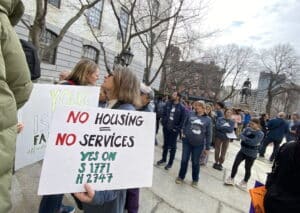
Supporters of legislation to provide a local option to impose real estate transfer fees prepare to enter the State House for a lobby day Thursday, March 23, 2023. Photo by Sam Doran | State House News Service
In a major win for the real estate lobby, leaders in the state Senate opted to leave out Gov. Maura Healey’s proposal to allow local-option real estate transfer fees, which more than a dozen communities are seeking to tax high-dollar property sales within their borders and generate money for affordable housing.
The House also did not adopt the policy, meaning it is likely dead for this session, though any senator could propose to add it through an amendment when the bill is debated Thursday. And supporters of the idea say they’ll keep pushing for it in future legislative sessions.
Local option transfer taxes have long been proposed on Beacon Hill, and the idea seemed to have legs this session – especially with a heavyweight in its corner, with the support of the governor. Healey and the state legislature are now more officially at odds over the idea, though the governor has been hesitant to publicly apply pressure to lawmakers over the policy. She has avoided directly answering when reporters have asked if she would still sign a housing bond bill that excludes the local-option transfer fee.
Edwards: Other Housing Tools Needed ‘Sharpening’
Real estate lobbyists have been pushing for over a year to discourage lawmakers from allowing the local-option taxes.
“To overcome the housing crisis, leaders on Beacon Hill need to prioritize policies that reduce barriers to housing creation, which will in turn help generate production of homes across all price points,” Greg Vasil, CEO of the Greater Boston Real Estate Board, said in a statement on Monday. “We are thrilled that the Senate Ways and Means’ version of the Housing Bond Bill unveiled today embraces these efforts by including massive investments in affordable housing, as well as streamlined permitting of Accessory Dwelling Units (ADUs), while also rejecting flawed policies such as transfer taxes.”
East Boston state Sen. Lydia Edwards has been a vocal supporter of the tax, and the housing bond bill sailed out of her committee earlier this year with the policy still included. Edwards sponsored an initiative in 2019 as a Boston city councilor to apply a 2 percent fee on real estate transactions above $2 million, which she said at the time could have raised $168 million for affordable housing in the city.
Asked by reporters why the fee wasn’t included in the Senate Ways and Means bill, Edwards said there are already a lot of existing housing production tools, and more would be created under the bill.
“Before we add an additional tax, we think it’s incumbent upon us to look at what we have already provided and tools in the toolkit for a lot of cities and towns, and to make sure they are sharpened to their best potential,” Edwards said.
Incentive Fund for CPA Spending
One of those “sharpening” measures in the new bill that is a $50 million incentive for Community Preservation Act communities who have spent the state CPA dollars on housing, she said.
“One hundred and ninety-six cities and towns have a form of CPA, and that is an opt-in local option kind of tax. And it has not been working as well as it should have been,” she said. “And before we add an additional tax bill, we need to make sure that we’re right sizing and ensuring that those are working correctly.”
Real estate trade groups had focused part of their sizable anti-transfer tax campaign on the relatively small share of CPA money many Boston suburbs spent on affordable housing projects.
They cited research by the Center for State Policy Analysis at Tufts University – commissioned by the GBREB – that found fewer than 1 in 20 projects funded with CPA dollars produced more housing and 40 percent of CPA projects were actually rehabilitation of historic properties. The research also found that in urban core communities like Boston, Cambridge, Chelsea and Somerville spend at least half of their CPA funds on housing creation or preservation, but 70 towns and cities weren’t meeting the legal requirement to spend at least 10 percent of CPA money on housing purposes each year.
Asked by reporters last week if she personally supported allowing transfer taxes, Senate President Karen Spilka of Ashland said, “I’m getting a feeling from the members. That is, to me, what is the most important.”
Supporter: ‘We’ll Be Back’
Sen. Jo Comerford of Northampton, who filed a bill this session seeking to broaden the scope of transfer fees to allow lower-income communities to use the tool, said the bill will create a commission to study the idea, with a provision to include a rural perspective.
“We’ll be back to work on this again,” she said.
Amherst, which is in Comerford’s district, was one of the municipalities that filed home rule petitions this session seeking to implement a new tax on high-dollar transactions to pay for affordable housing.
“The Amherst town manager talked at length about the town’s extensive use of CPA funds for housing, they’ve dedicated ARPA funds, they’ve formed a housing trust fund. This is a community that is pro-housing, and they’re just asking us for another tool in this home rule petition. And I believe they should have that if they believe they can use it right,” she said.
More than 10 other towns in her district are also considering how transfer taxes could work for their communities, Comerford said.
“We want to be able to give communities the tools they’re asking for,” she said.
More Housing Bills to Come
Sen. Julian Cyr of Truro was also a vocal supporter of the fee, as communities on Cape Cod and the islands of Martha’s Vineyard and Nantucket have sought to implement the policy. Housing advocates who support the proposal say it would be especially helpful in communities with a lot of tourism, such as the Cape and islands, where wealthy people buy property without living there year-round, pushing out locals. The tax on the expensive second-home sales would help fund affordable housing for local residents, they say.
“Of course, I’m disappointed that a local-option transfer fee was not included in the base bill, but I continue to see momentum on this,” Cyr said. “A revenue source that would work well for some communities, many of which I represent, would help those communities solve a very real problem and also stretch limited state taxpayer dollars elsewhere in the state, where this particular tool might not make sense.”
Cyr said there are policies in the bill that will help seasonal communities like the Cape and islands, and he’s hopeful that lawmakers will come back to the transfer fee in a future housing bill.
“I’m encouraged to hear this isn’t the only housing bill we’ll do for the next decade,” he said.
Cyr is a member of Spilka’s leadership team, and Comerford is the assistant vice chair of the powerful Ways and Means Committee.
Seasonal communities like those in Cape Cod and the southern Berkshires that have 40 percent or more of their houses as secondary properties would still get a new housing tool from the Senate version of Healey’s housing bill, Cyr said.
It would allow a path for communities to implement a year-round deed restriction program, which would create financial incentives for homeowners to reserve their properties for year-round housing. This would apply to both houses that are rented and those lived in year-round by their owners.
“This is a crucial tool for us. We need to be able to preserve units for people who actually live here,” Cyr said. “Aspen, Vale and California towns around Tahoe have used this tool, and we’ll soon be able to if the Senate language prevails in conference … Police chiefs, fire chiefs and our schools have been reaching out to us to provide housing for our municipal workforce. This bill does that.”








